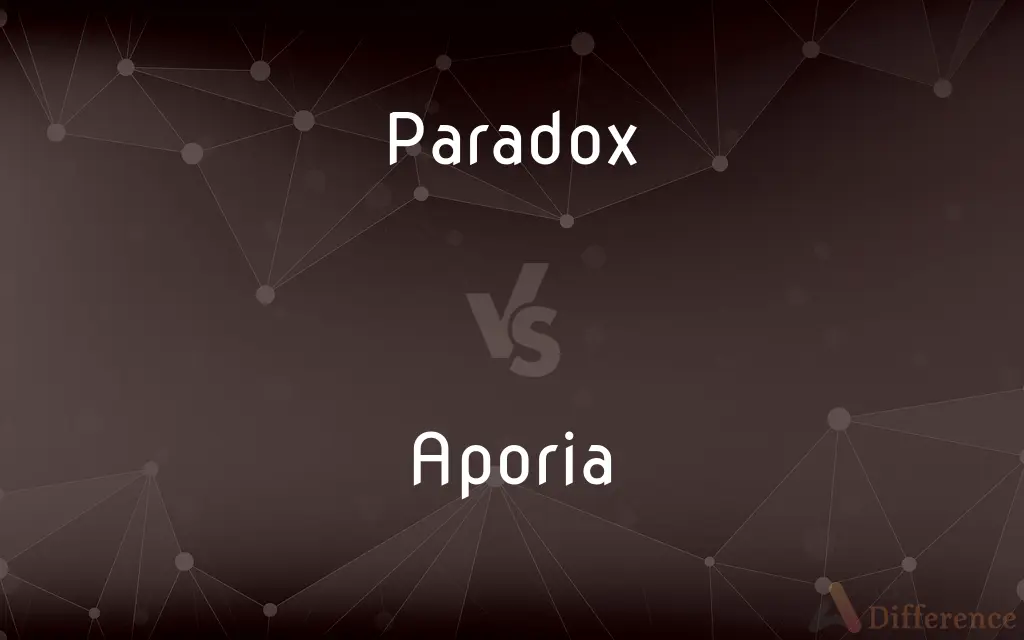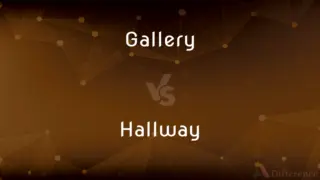Paradox vs. Aporia — What's the Difference?

Difference Between Paradox and Aporia
ADVERTISEMENT
Compare with Definitions
Paradox
A paradox is a logically self-contradictory statement or a statement that runs contrary to one's expectation. It is a statement that, despite apparently valid reasoning from true premises, leads to a seemingly self-contradictory or a logically unacceptable conclusion.
Aporia
In philosophy, an aporia (Ancient Greek: ᾰ̓πορῐ́ᾱ, romanized: aporíā, lit. 'literally: "lacking passage", also: "impasse", "difficulty in passage", "puzzlement"') is a conundrum or state of puzzlement. In rhetoric, it is a declaration of doubt, made for rhetorical purpose and often feigned.
Paradox
A seemingly absurd or contradictory statement or proposition which when investigated may prove to be well founded or true
The uncertainty principle leads to all sorts of paradoxes, like the particles being in two places at once
Aporia
A figure of speech in which the speaker expresses or purports to be in doubt about a question.
Paradox
A statement that seems to contradict itself but may nonetheless be true
The paradox that standing is more tiring than walking.
ADVERTISEMENT
Aporia
An insoluble contradiction or paradox in a text's meanings.
Paradox
A person, thing, or situation that exhibits inexplicable or contradictory aspects
"The silence of midnight, to speak truly, though apparently a paradox, rung in my ears" (Mary Shelley).
Aporia
(rhetoric) An expression of deliberation with oneself regarding uncertainty or doubt as to how to proceed.
Paradox
A statement that is self-contradictory or logically untenable, though based on a valid deduction from acceptable premises.
Aporia
An insoluble contradiction, especially in a text's meaning; a logical impasse suggested by a text or speaker.
Paradox
An apparently self-contradictory statement, which can only be true if it is false, and vice versa.
"This sentence is false" is a paradox.
Aporia
A figure in which the speaker professes to be at a loss what course to pursue, where to begin to end, what to say, etc.
Paradox
A counterintuitive conclusion or outcome.
It is an interesting paradox that drinking a lot of water can often make you feel thirsty.
Paradox
A claim that two apparently contradictory ideas are true.
Not having a fashion is a fashion; that's a paradox.
Paradox
A thing involving contradictory yet interrelated elements that exist simultaneously and persist over time.
Paradox
A person or thing having contradictory properties.
He is a paradox; you would not expect him in that political party.
Paradox
An unanswerable question or difficult puzzle, particularly one which leads to a deeper truth.
Paradox
(obsolete) A statement which is difficult to believe, or which goes against general belief.
Paradox
(uncountable) The use of counterintuitive or contradictory statements (paradoxes) in speech or writing.
Paradox
A state in which one is logically compelled to contradict oneself.
Paradox
The practice of giving instructions that are opposed to the therapist's actual intent, with the intention that the client will disobey or be unable to obey.
Paradox
A tenet or proposition contrary to received opinion; an assertion or sentiment seemingly contradictory, or opposed to common sense; that which in appearance or terms is absurd, but yet may be true in fact.
A gloss there is to color that paradox, and make it appear in show not to be altogether unreasonable.
This was sometime a paradox, but now the time gives it proof.
Paradox
(logic) a self-contradiction;
`I always lie' is a paradox because if it is true it must be false
Share Your Discovery

Previous Comparison
Gallery vs. Hallway
Next Comparison
Wrap vs. Package













































